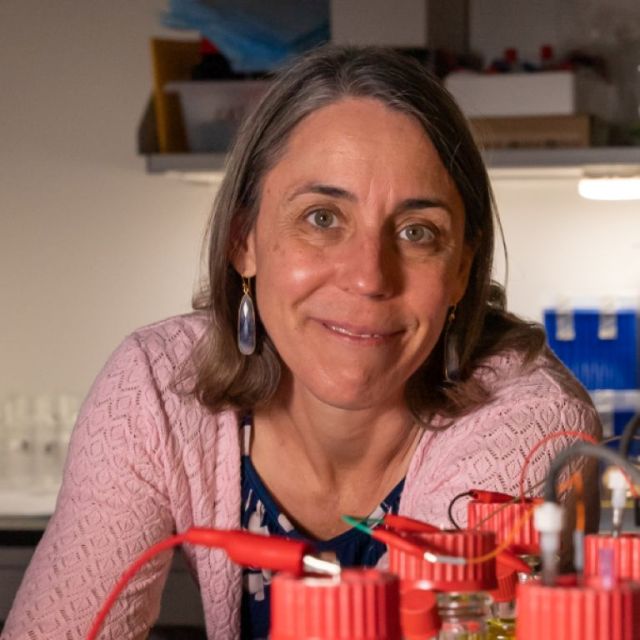Caroline Ajo-Franklin, Ph.D, Professor of BioSciences, Rice University, "Engineering Real-time Sensors and Sustainable Materials for a Healthier Planet"

Speaker:
Caroline Ajo-Franklin, Ph.D
Professor of BioSciences
Rice University
Faculty Host: Carrie Mills
Title: Engineering Real-Time Sensors and Sustainable Materials for a Healthier Planet
Abstract:
We currently face rising global temperatures, dwindling natural resources, and increasing threats to human and ecological health. To help meet these challenges, my research group engineers biomolecules and microorganisms for real-time bioelectronic sensing and sustainable materials synthesis. We draw inspiration from how proteins and microorganisms transfer electrons to their environments and scaffold advanced materials. By leveraging these natural processes, we engineer microorganisms with specific capabilities to report on sensing through electron transfer and to create multifunctional living materials.
In the first part of my presentation, I will describe how we programmed bacteria to grow into macroscopic materials with tunable mechanical properties. We engineered Caulobacter crescentus to display and secrete an engineered self-interacting protein. This protein assembles cells into hierarchically ordered, centimeter-scale living materials. Manipulating the sequence and domain architecture of the self-interacting protein allows control over the mechanical properties of the resulting materials. This work provides a new platform for growing macroscopic materials with simultaneous control over the materials and biological properties and a route towards sustainable plastics and rubbers.
In the second part of my presentation, I will describe how we are developing fast, multiplexed, and simple strategies for controlling electron flow between microorganisms and electrodes to sense and actuate cell behavior. To multiplex information, we developed a multichannel bioelectronic sensor in which different chemicals modulate two extracellular electron transfer pathways with different midpoint potentials in Escherichia coli. We then developed a double-potential step chronoamperometric method to distinguish whether one or both pathways are active in this strain. We have also discovered the molecular details behind a very efficient, latent extracellular electron transfer pathway in E. coli that utilizes the redox mediator, 2-hydroxy-1,4-naphthoquinone HNQ. These studies provide routes to both increase the information content and the robustness of the electron transfer pathways for communication between microelectronics and microorganisms.
Bio:
Caroline Ajo-Franklin earned a B.S. in chemistry from Emory University in Atlanta, GA in 1997 and a Ph.D. in chemistry from Stanford University in Palo Alto, CA in 2004. She trained as Postdoctoral Fellow with Prof. Pam Silver in the Department of Systems Biology at Harvard Medical School from 2005-2007, where she was one of first group members working in synthetic biology. She then started her independent career as a Staff Scientist within the Molecular Foundry at Lawrence Berkeley National Laboratory in Berkeley, CA. During this time, she developed a deep appreciation and interest in materials. In 2019, she joined the faculty of Rice University in Houston, TX as a Professor of BioSciences. At Rice, she has joint appointments in the Department of Bioengineering, the Department of Chemical and Biomolecular Engineering, and the Baker Institute of Public Policy. In 2023, she was named as the Founding Director of the Rice Synthetic Biology Institute and in 2025, she was named as a Trustee Professor of BioSciences.
Her strongly interdisciplinary, highly collaborative research program focuses on exploring the interface between living organisms and non-living materials and engineering this interface for applications in energy, environment, and biomedicine. Prof. Ajo-Franklin was named as a recipient of the Women@ the Lab award in 2018, a Cancer Prevention and Research Institute of Texas (CPRIT) Scholar in 2019, and a fellow of the American Institute for Medical and Biological Engineering in 2024. She has served on the Editorial Board of ACS Synthetic Biology, an Editor at mSystems, and is a member of the Biological and Environmental Research Advisory Committee (BERAC) for the Department of Energy.